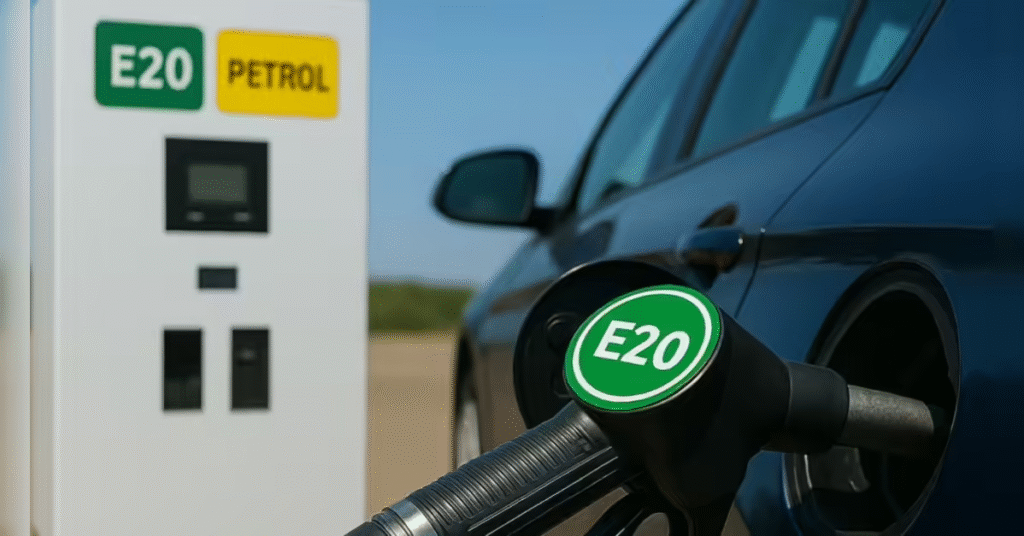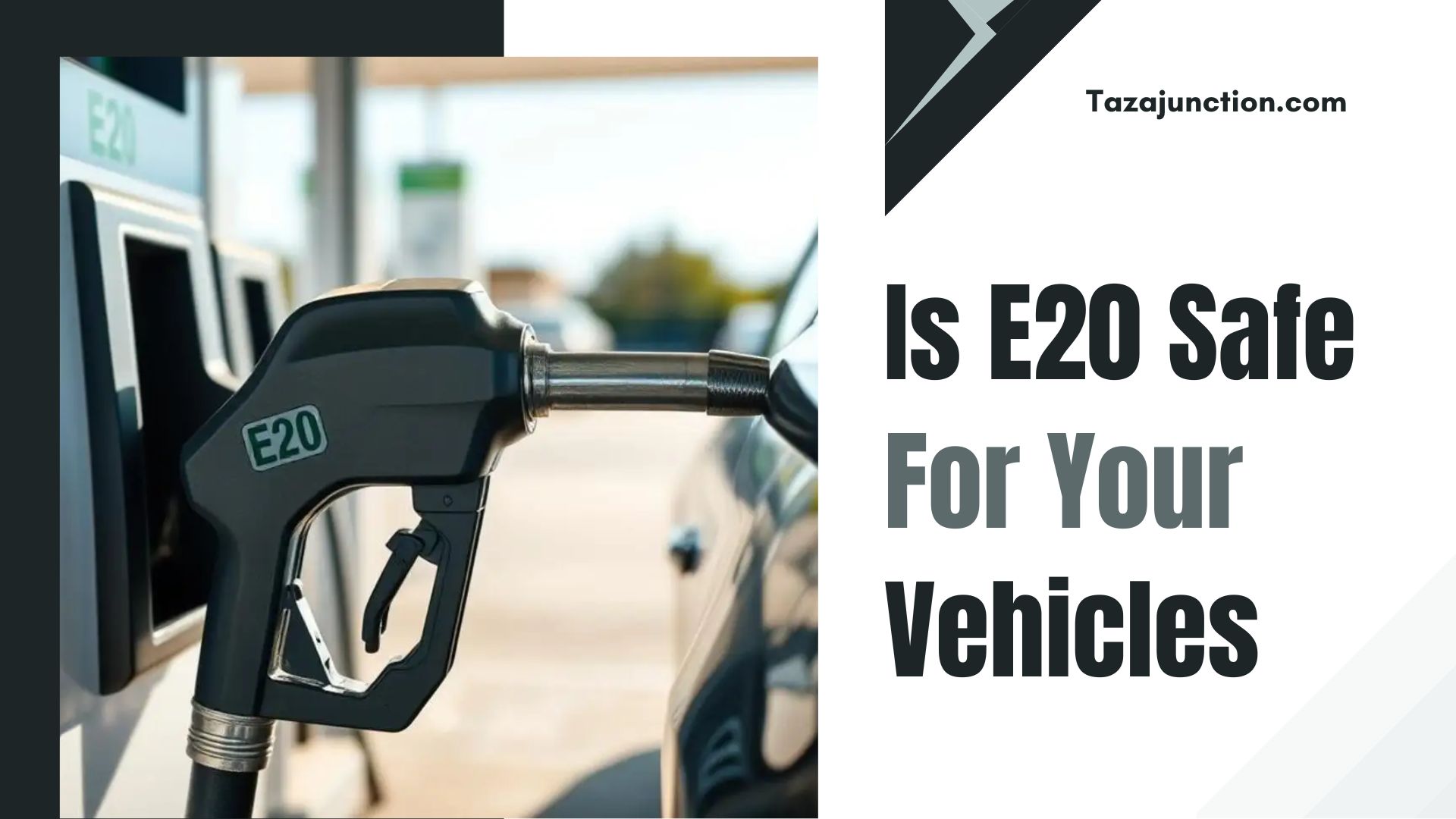The automotive industry in India is currently undergoing a massive transformation. With the government pushing towards cleaner fuels and eco-friendly policies, ethanol-blended fuel has become a major topic of discussion.
Among these, the introduction of E20 fuel—a blend of 20% ethanol and 80% petrol—has stirred conversations across consumers, manufacturers, and policymakers alike.
Many vehicle owners are asking: Is E20 safe for your vehicles?
To address this, we take a closer look with TazaJunction.com at what industry leaders and experts have said about the use of E20, its potential benefits, and the challenges it poses.
Table of Contents
Understanding E20 Fuel
Before answering the critical question—Is E20 safe for your vehicles—it is essential to understand what E20 fuel actually is. Ethanol is a renewable fuel derived mainly from sugarcane, corn, or other biomass sources.
Blending it with petrol reduces dependency on fossil fuels, cuts down carbon emissions, and supports farmers by creating a new revenue stream.
Currently, India uses E10 (10% ethanol blend), but the government has set a target to achieve E20 blending nationwide by 2025–26. This target has made it necessary for the industry to evaluate how well vehicles can adapt to higher ethanol content.
The Promise of Cleaner Fuel
Proponents of ethanol blending highlight environmental and economic benefits. They argue that higher ethanol use will:
- Reduce India’s crude oil import bill.
- Lower carbon emissions, aligning with the country’s sustainability goals.
- Support domestic farmers through increased demand for sugarcane and other ethanol-producing crops.
From this perspective, Is E20 safe for your vehicles isn’t just a consumer question but a national policy priority. However, transitioning to E20 comes with technical and safety concerns.
Industry Leaders Weigh In

Automotive companies, fuel suppliers, and policymakers have all voiced opinions on the adoption of E20. Let’s look at what they admit.
1. Automakers’ Perspective
Car manufacturers like Maruti Suzuki, Hyundai, and Honda have acknowledged that not all vehicles on the road are ready for E20. While new models are increasingly being designed to handle ethanol-blended fuel, older vehicles may face issues such as:
- Corrosion of fuel system components.
- Reduced engine efficiency.
- Increased maintenance requirements.
Automakers suggest that E20-compatible vehicles will gradually phase into the market, but they also caution owners of older vehicles to check with manufacturers before switching. This directly ties to the question: Is E20 safe for your vehicles if they were manufactured years ago?
2. Oil Marketing Companies
Fuel providers like Indian Oil and Bharat Petroleum admit that distribution infrastructure is being upgraded for E20. However, they also acknowledge challenges with storage and handling, since ethanol attracts water and can lead to contamination if not managed properly.
3. Government and Policymakers
The Ministry of Petroleum and Natural Gas strongly supports ethanol blending. According to the government, E20 is a crucial step towards “Atmanirbhar Bharat” (self-reliant India). But even they recognize that adoption requires consumer awareness, manufacturer readiness, and robust fuel infrastructure.
Impact on Different Types of Vehicles
The key issue behind Is E20 safe for your vehicles depends on what type of vehicle you drive.
- Two-Wheelers: Most modern two-wheelers manufactured after 2022 are designed to handle E20. However, older models may face issues with carburetors and rubber seals.
- Cars: Newer cars, especially those launched in the past two years, are increasingly E20-compliant. For older cars, compatibility depends on the manufacturer’s design specifications.
- Commercial Vehicles: Trucks and buses will need significant upgrades since their engines are more sensitive to ethanol blends.
- Luxury Vehicles: Many premium cars imported into India are optimized for fuels used in Europe or the U.S. Compatibility with E20 may vary widely.
Consumer Concerns
Even as the government promotes ethanol blending, consumers worry about mileage and performance. A recurring question is: Is E20 safe for your vehicles when it comes to efficiency?
Studies indicate that ethanol has a lower energy density than petrol. This means vehicles running on E20 could see a slight reduction in fuel economy—estimates suggest a 6–7% drop in mileage.
Maintenance costs also concern vehicle owners. Ethanol can corrode rubber, plastic, and some metal parts. Unless vehicles are designed with ethanol-resistant materials, the long-term durability of engines could be at risk.
Industry Solutions
Automakers and suppliers are not ignoring these concerns. Steps being taken include:
- Upgraded Materials: Vehicles are being designed with ethanol-resistant fuel lines, tanks, and seals.
- Software Calibration: Engine control units (ECUs) are being optimized to manage ethanol blends better.
- Consumer Guidelines: Manufacturers are publishing advisories so that owners can check compatibility.
Industry leaders admit that while challenges exist, solutions are being actively implemented. Therefore, the answer to Is E20 safe for your vehicles depends largely on whether your vehicle is updated to meet these changes.
Long-Term Benefits of E20

Despite the current challenges, the move towards E20 brings undeniable benefits.
- Environmental Impact: Ethanol blending reduces greenhouse gas emissions, making transportation greener.
- Energy Security: India imports 80% of its crude oil needs. E20 will reduce dependency on volatile global oil markets.
- Agricultural Boost: Farmers stand to gain as ethanol demand increases crop utilization.
These benefits highlight why the government and industry are working hard to ensure that Is E20 safe for your vehicles is not just a question, but an achievable reality.
What Consumers Should Do
If you are concerned about whether E20 is safe for your vehicles, here are steps you can take:
- Check with Your Manufacturer: Verify if your vehicle is certified for E20.
- Look for Fuel Labels: Petrol pumps dispensing E20 will be labeled clearly.
- Maintain Regular Service: Stay ahead of potential issues by following your vehicle’s maintenance schedule.
- Consider Upgrading: If your car or bike is older, you may want to upgrade to an E20-compatible model in the coming years.
Conclusion
The debate around ethanol-blended fuel is both exciting and complex. As India gears up for a cleaner and more self-reliant future, the rollout of E20 is inevitable.
But the big question—Is E20 safe for your vehicles—does not have a simple yes or no answer. It depends on the make, model, and year of your vehicle, as well as how well manufacturers and fuel providers manage the transition.
Industry leaders admit that while challenges like engine wear, corrosion, and mileage reduction exist, technological solutions are being introduced to make E20 adoption smoother.
The transition may not be flawless, but with consumer awareness, manufacturer innovation, and government support, E20 can be a turning point in India’s journey toward sustainable mobility.
So the next time someone asks, Is E20 safe for your vehicles, the honest answer is: it can be—provided your vehicle is designed or upgraded to handle it.

